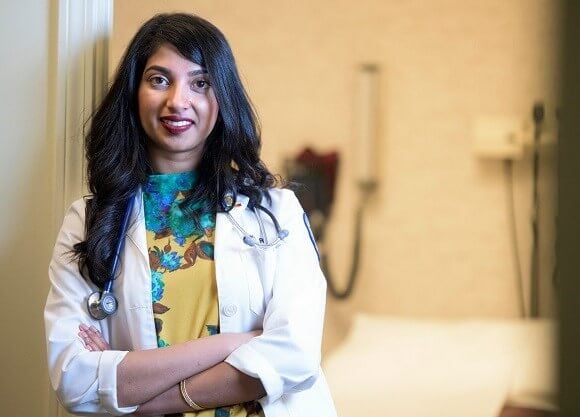
Medical student made life a little better for Syrian refugees in Greece
March 07, 2017

March 07, 2017

The third-year medical student spent 10 days in Greece last summer volunteering at the Ritsona camp for Syrian refugees, an hour north of Athens. With scarce supplies and three modest meals distributed daily, it wasn’t uncommon for tensions to flare and for people, often hungry and desperate, to beg for more.
The camp provides food and shelter for roughly 600 refugees, most of whom fled their homes in Syria — a country that has endured almost six years of a civil war that has created the largest humanitarian crisis since World War II.
The toughest part of the job, Rahman recalls, was looking them in the eyes and apologetically turning them away because of the strict rules regulating how supplies were rationed. Every family got a meal ticket that specified how many adults and children were entitled to provisions, and Rahman would mark the ticket to note that the family had received its provisions for that day. But it wasn’t a perfect system. Sometimes a refugee would show up with a card that appeared to be marked, but claiming they hadn’t gotten any food yet. Rahman would have to refuse them, unsure if there had been an honest mistake.
“To deny somebody food is absolutely horrible, especially if you don’t know whether they’re telling the truth,” the third-year medical student said.
“Did someone steal their card? Will they go hungry today? Your ethnics are challenged. A lot of families would send their young kids to get supplies, and I’d have to say no if their tickets had been marked. It was heartbreaking.”
Rahman, a Muslim of Pakistani descent, speaks Arabic. She feels a deep connection to the refugees, most of whom took harrowing paths to get there. Some bartered for transportation, or walked great distances through neighboring Turkey, or braved the treacherous waters of the Aegean Sea on homemade rafts that often capsized. One man who lost his entire family when their raft sank made a habit of gathering trash from around the camp every morning and then bringing it to Rahman for disposal. When she asked him why he chose to do that, he explained that he needed a purpose.
Summer temperatures could exceed 100 degrees, and with no air-conditioning and limited water supplies, Rahman would dip into her own pocket on occasion to buy bottled water to hand out on particularly hot days.
She persuaded her parents to accompany her on this trip, and she and her mother worked distributing clothing and supplies from a warehouse packed with donations. Residents would have 10 or 15 minutes to quickly grab whatever they could. Because there were no laundry facilities, people needed new clothes almost daily, and Rahman devised a system to help make the process more efficient, sorting clothes by gender and size and drawing diagrams to assist people unable to read.
Since the war erupted, nearly 5 million people have been displaced, with many relocating to Europe. Greece has served as an entry point for asylum-seekers desperate for a chance to rebuild their lives in Sweden, Germany, the UK and elsewhere.
As the public backlash to the influx of refugees rippled across the continent, the asylum process largely stalled, stranding more than 50,000 refugees in primitive camps throughout Greece. The fates of these families are tied to the shifting political currents within the European Union, which so far has accepted about 5 percent of the refugees its members initially pledged to help.
Rahman developed her passion for service and social justice as a Near Eastern Studies major at Cornell University. The Syrian war broke out while she was in college, and she followed it closely, eager to find a way to help citizens caught in the crossfire. When one of her mother’s friends told her about the Echo100Plus organization, an Austrian-based charity that coordinates volunteer trips, Rahman jumped at the opportunity to get involved. She had traveled abroad previously to volunteer, working with Habitat for Humanity in Jordan, but she wasn’t entirely prepared for the emotional toll this trip would take on her.
“It was really tough adjusting to my life when I came back to the U.S.,” she said as she scrolls through a photo gallery from her time at the camp. “You can hear about the difficulties of people across the country and around the world, but it’s completely different when you actually face the harsh reality of inequality. You realize how lucky you are.”
The refugees’ spirit and generosity inspired Rahman.
“They had absolutely nothing, and still they were dragging me into their tents for tea or a snack or even dinner with their families,” she said. “The hospitality just flowed from their hearts.”
Rahman recalled that her father initially was hesitant to go.
“He said, ‘I don’t speak Arabic, how am I going to help? Wouldn’t it be better if we just gave money?’ But after coming with me, his whole mindset changed. He understood that smiles and just small understandings was enough to make an impact. Both he and my mom worked incredibly hard,” she said.
Rahman observed glimmers of happiness and optimism. After her shift, she would walk around the camp and enjoy lighter moments as she got to know the families. The camp experience made such a profound impact on Rahman that she can’t wait to return and perhaps bring some of her fellow students and faculty from the medical school with her.
Quinnipiac Today is your source for what's happening throughout #BobcatNation. Sign up for our weekly email newsletter to be among the first to know about news, events and members of our Bobcat family who are making a positive difference in our world.
Sign Up Now